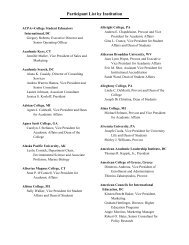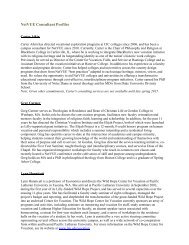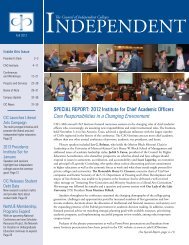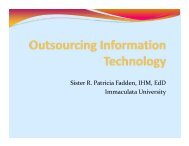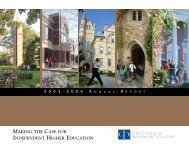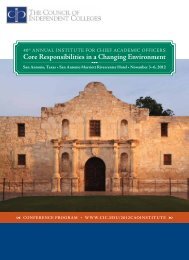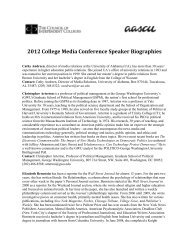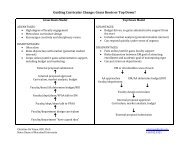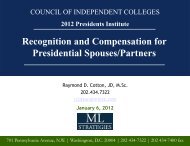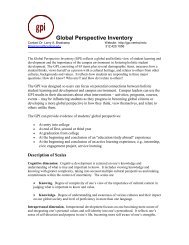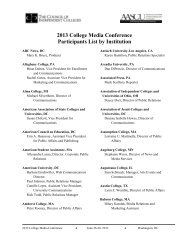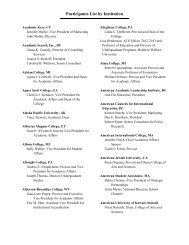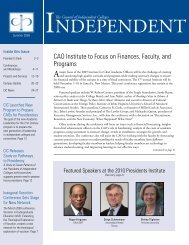Winter/Spring 2003 - The Council of Independent Colleges
Winter/Spring 2003 - The Council of Independent Colleges
Winter/Spring 2003 - The Council of Independent Colleges
- No tags were found...
Create successful ePaper yourself
Turn your PDF publications into a flip-book with our unique Google optimized e-Paper software.
PRESIDENTS INSTITUTECHANGING STUDENTPOPULATIONUnderstanding theMillennial Generation<strong>The</strong> new generation <strong>of</strong> studentsapproaching college age is not, as manyexperts have predicted, more cynical,alienated, pessimistic about the future,attracted to risk, or prone to criminalactivities, said author Neil Howe duringa plenary address at the PresidentsInstitute. Rather, prospective students inthis “millennial generation,” as Howecalls them, are “attracted to big-nameuniversities, long traditions, and a tightsense <strong>of</strong> community. <strong>The</strong>y are riskaverse,and they like to work with thebest and latest high-technology gadgets.”Howe is an authority on characteristics<strong>of</strong> different generations in Americaand author <strong>of</strong> a 100-page handbookentitled Millennials Go To College:Strategies for a New Generation onCampus—Recruiting and Admissions,Student Life, and the Classroom, designedto help college administrators anticipatehow the new millennial generation ischanging and will continue to changecollege life.Based on his data and observations,Howe <strong>of</strong>fered college and universitypresidents a number <strong>of</strong> recommendationsand suggestions as to what toexpect and how to plan for the millennialgeneration.<strong>The</strong> millennial generation is raciallyand ethnically diverse (38 percent arenonwhite or Latino; 33 percent areAsian), Howe said, adding that the dataon cohort characteristics are much morepositive than had been predicted.“<strong>The</strong>re has been a 60-70 percentreduction in the rate <strong>of</strong> serious, violentcrime among this age cohort; rates <strong>of</strong>pregnancy, abortion, and birth rates aredown to one-half <strong>of</strong> what they were inthe early 1980s; drug usage is down;tobacco usage is the lowest ever recorded;and alcohol consumption is down,”Howe reported. In fact, he said, “themillennials are into teamwork, groupprojects, service learning, andcommunity service. <strong>The</strong>se changes aredue to many factors, according to Howe.“<strong>The</strong> consciousness revolution wasebbing when they came along—by the1990s, society’s emphasis was on raisinga better generation <strong>of</strong> kids, and therewas a more positive depiction <strong>of</strong> kids inthe media and movies. In addition, duringthis time period, divorce rates werefalling, school accountability was up, theU.S. was going through an expansiveeconomic boom period, and child carehad become more pr<strong>of</strong>essional.<strong>The</strong>se and other changes in thecoming generation will have an impacton colleges in myriad ways, Howe said,and college administrators need to beprepared.Millennial children have been sheltered,so colleges should:• play up tradition and the public trustdimension <strong>of</strong> college policies;• assume there are no acceptable risks;• market a safe environment;• emphasize a top health staff;• expect in loco parentis to dethroneFERPA; and• promise protection from corruptingvalues and commercialism.<strong>The</strong> millennial students areconfident, happy, and optimistic,so colleges should:• prepare for students who have a lotand expect a lot;• stress good outcomes;• use social norming; and• create the expectation <strong>of</strong> success forall, including special needs kids.This cohort is team-oriented, socolleges should:• stress friendship and duty to helpothers;• showcase groups and team skills; and• prepare for rapid growth in mainstreampolitical and communityorganizing.Millennial students are pressured(an unprecedented number plan to go tocollege—84 percent in 2002, 66 percent<strong>of</strong> whom plan on attending a four-yearinstitution), security conscious (84 percentsay security is very important),sleep deprived (two-thirds <strong>of</strong> highschool students say they don’t getenough sleep), and planners (88 percenthave specific five-year career goals).<strong>The</strong>refore, colleges should:• expect admissions and grading togrow ever more selective;• retool classrooms for constant testing,feedback, monitoring, and skillsmastery;• stress long-term life planning overshort-term opportunities; and• <strong>of</strong>fer a balanced life—not push onething too much.<strong>The</strong>y are achievers, with rising pr<strong>of</strong>iciencyin math and science and higherSAT scores. <strong>The</strong>y spend a lot more timeon their homework than previouscohorts; more <strong>of</strong> them have a stay-athomeparent who is focused on their(cont’d on page 16)Plenary speaker Neil Howe, best-sellingauthor and speaker, described the characteristics<strong>of</strong> the emerging “millennial generation”based on data in his new handbook,Millennials Go to College, during hisPresidents Institute address. He is an authorityon characteristics <strong>of</strong> different generationsin America and has co-authored four widelyused books: Generations, 13th-Gen, <strong>The</strong>Fourth Turning, and Millennials Rising.<strong>Independent</strong> 13 www.cic.edu<strong>Winter</strong>/<strong>Spring</strong> <strong>2003</strong>



